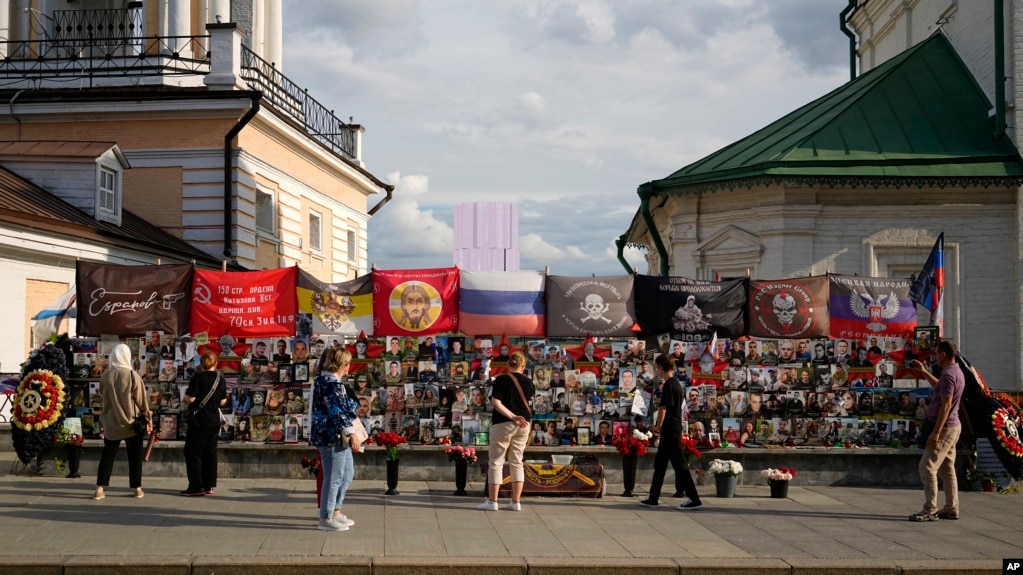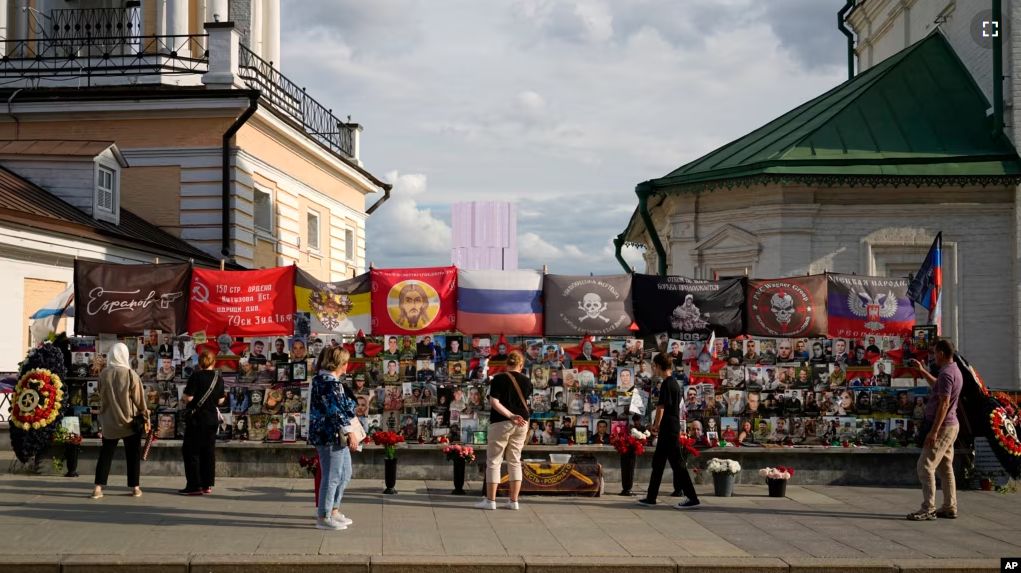
People stand near a memorial to Russian mercenary chief Yevgeny Prigozhin, who died in a plane crash last year, in Moscow on July 29, 2024. Prigozhin’s Wagner unit suffered heavy losses in an attack in Mali last week.
There is no clarity about the losses days after the Malian military and the supporting Russian Defense Ministry’s Wagner units clashed with Tuareg separatist rebels and al-Qaida affiliate JNIM fighters in the desert near the border with Algeria.
The news reports vary from 20 to 80 Wagner troops killed. No official in Russia commented on the fighting or specified loses. Mali issued a vague statement about significant losses, after initially claiming that only two of its servicemen were killed in the attack.
The fighting took place in the northeastern town of Tinzaouaten between July 22 and 27, when the Malian army and Wagner troops came under attack from Tuareg rebels, possibly in coalition with the JNIM. The Russian sources say the final attack came immediately after a strong sandstorm.
A week earlier, the Malian Army and Wagner troops announced they had recaptured some areas from Tuareg rebels.
The Associated Press reported that Russia’s Wagner unit suffered its biggest losses to date on African soil.
What happened during the five days of fighting remains subject to propaganda and disinformation.
On July 27, the Malian army claimed it had killed at least 20 terrorists and destroyed several vehicles and a large amount of military equipment.
It then went on to declare its losses:
“There were two dead, ten wounded, two armored personnel carriers, and two pickup trucks were disabled.”
That is misleading.
The Tuareg rebels in coalition with JNIM (Jama’at Nusrat al-Islam wal-Muslimin), distributed videos and photos of the aftermath saying they had killed “10 Malian soldiers and over 50 Wagnerites.”
The footage went viral on social media, and independent investigative journalists verified most of the videos and images, confirming the heavy losses suffered by the Wagner troops and the Malian military and thus discrediting the army’s version of the events and casualties.
The Tuareg rebels said they “had taken hostage several Malian soldiers and Wagner fighters.”
On July 30, the Wagner group said in a post on its Telegram massaging app it had suffered “heavy losses” during the attack, which lasted five days in Mali’s north, but it provided no figures.
However, international media outlets, including AP, Reuters and BBC, reported that “between 20 and 80 Wagner fighters” were killed during the attack.
Russia’s state-run news agency, TASS, reported that “only three Russian fighters survived the battle, and their commander Sergey Shevchenko was among those killed in action.”
On July 30, the Malian army, while trying to do damage control, issued another statement admitting it had ‘’suffered significant losses,” without stating the actual figures of the dead or injured.
The Malian army and Wagner said that “the military and the Wagner fighters [were] killed in combat” while on patrol in northern Mali in Tinzawaten village near the Algeria border.
The Malian government has referred to the Wagner troops as “Russian military trainers” since their arrival in Mali in December 2021. At the time, Wagner was a paramilitary group operating covertly on behalf of the Russian government. Russian President Vladimir Putin officially placed Wagner under the command of the Russian Defense Ministry in 2023, after the death of the group’s founders Evgeny Prigozhin and Dmitry Utkin in a plane crash.
On February 8, the U.S. State Department, in a report titled “The Wagner Group’s Atrocities in Africa: The Lies and the Truths,” said, “Before Wagner’s deployment to Mali, Russia highlighted false narratives like those it deployed about [Central African Republic], repeating the myth that “Russian instructors” would bring peace, stability, and would also have new success at fighting counterterrorism in the country.”
A United Nations investigation said last year that “more than 500 people were killed — the vast majority summarily executed — by Malian troops and foreign military personnel during a five-day military operation in the village of Moura in the Mopti region of central Mali in March 2022.”
Human Rights Watch and other human rights watchdogs accused Wagner of war crimes in Africa, including rape, torture and defilement.

